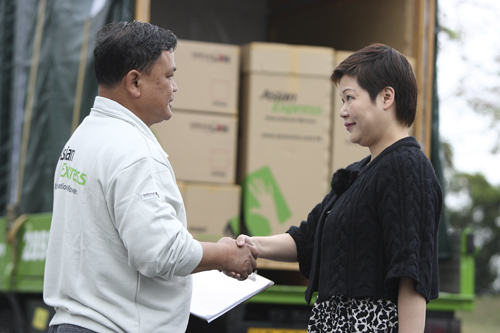Few events inspire as much dread as moving. Packing up one’s belongings and relocating within the same city is difficult enough, let alone overseas. Consider language barriers, slow Internet, and ever-changing import and export regulations, and you can start to see why China poses a special challenge for expats relocating to or from here.
Though employee benefits have decreased in recent years, some international companies still offer relocation packages and may pre-select a mover for the process. However, many families must do their own research and make the move without the help of a relocation consultant.
Terms of Service
To begin with, many people are unclear about the differences between the terms “moving,” “shipping,” and “relocation.” Chad Forrest, the general manager of Asian Express (AE) International Movers, says to think about moving as one part of the relocation process.
“The traditional components of relocation are moving, the home search, visa, immigration, and cross-cultural training. A moving company focuses on the moving aspects. A relocation company will engage in all separate components in one way or another,” he explains.
Many moving companies have logistics divisions, which typically move products rather than household goods. Some have a general cargo division that focuses on large projects and moving machinery.
Then, there are “relocation management companies” (RMCs) which outsource different stages of the relocation process. They might contract with one company to oversee global relocation, another for immigration, and yet another for cross-cultural training; all the while, the RMC remains the single point of contact for the client.
Finally, “shipping” refers to the part of the international moving process where personal belongings and household goods are transported by sea or air freight to the destination country. Generally, air freight is quicker but more expensive while sea freight is slower but cheaper. More commonly, a moving company would be your point of contact for shipping services.
There is no best option; it all depends on your family’s needs and budget. In any case, be sure to obtain quotes from at least three companies, arrange a visual survey of the belongings to be shipped, and plan ahead as much as possible. Very little is negotiable when it comes to relocation fees, so getting an accurate estimate upfront will significantly simplify the process.
Preparing for the Visual Survey
If you are engaging the services of a relocation or moving company, one of the most important parts of the process is the visual survey. This is when an employee comes over and inventories everything your family is planning to ship; some surveyors log the belongings into a tablet while others use good old pen and paper.
Before the survey, cull as much as possible by donating or selling anything you do not need. “If you have a copy of Tom Clancy’s Hunt for Red October that you’ve been carrying around since 1980, you can probably donate that,” says Chad Forrest from Asian Express.
Having a tidy house and setting out everything you are planning to take can save you considerable time and money. “Often when we go to a villa and there’s a garage, [the client]might open it up and say ‘About half of that will go.’ But the move date comes up so quickly that people don’t have time to remove half of that and end up packing everything,” explains Forrest.
An experienced surveyor would take note of such situations and be able to accurately how much space different items will take up in a shipment container. Expect the surveyor to open cabinets, drawers, and wardrobes. Keep in mind that the survey is by definition an estimate; this is why it is important to get several quotes. “If two moving companies have estimated a similar volume and the third is way out, then you pretty much have the answer to your question,” says Forrest.
Moving on a Budget
Where in the relocation process can families save money? The best thing they can do is get the process started as early as possible, says Forrest. For starters, there is a wealth of information online about how to organize and estimate the value of possessions before a move. During off-peak times, contacting the moving company one month in advance is fine; however, Forrest recommends getting in touch in early April if you are planning to move, say, during the last week of June.
It bears repeating that paring down your belongings ahead of time can go a long way, both financially and logistically. “This goes for anyone who is moving, not just those paying for [the relocation]themselves,” says Forrest. “There are even people who can come in and help you do this.”
Air or sea freight may not be worth the price for expats with smaller-volume shipments. “[For a moving company], it’s the same amount of work for 4 cubic meters and 20 cubic meters – the only difference is packing. The office work and everything else that goes into helping you is the same,” says Forrest. If you have soft items, he recommends packing them into check-in luggage; some people simply mail their extra belongings back home through China Post.
If you have the flexibility to choose when to move, you are more likely to get a good deal if you relocate during off-peak months such as fall or early spring and winter rather than June or July.
Watch out for hidden fees, especially if you are planning the move yourself. There are many parts to the relocation process and each stage carries its own costs, so be sure to clarify exactly which services and conditions are included in a quote: door to door, door to port, port to port, air versus sea freight, etc.
Consider making a moving budget several months before the intended relocation date to prepare for unforeseen costs. Nomadic Matt, a blogger who has traveled to over 80 countries and author of How to Travel the World on $50 a Day, recommends cutting down on unnecessary daily expenses such as Starbucks coffee. Assuming you spend USD 5 on coffee every day, that amounts to USD 150 a month or USD 1,800 per year – enough to last a single traveler around two months in southeast Asia.
Quality Control
When comparing moving companies, be sure to check accreditations and certifications. “The primary one is called FIDI [Federation of International Furniture Removers]. Member companies must go through a quality audit and continue to be re-certified,” says Forrest. FIDI’s certification process is known as FIDI Accredited International Movers (FAIM).
Another certification body is the International Organization for Standardization (ISO); the main difference with FAIM that ISO companies set their own procedures and are audited by ISO based on these procedures, while FAIM sets their own standards and companies either pass them or do not.
“This includes everything from financials, to what the warehouse roof is made of, to calling the receptionist and seeing how long it takes for the office to direct you to someone who can answer your question,” says Forrest. FAIM also examines the company’s claims loss ratio and how quickly insurance claims are processed.
Changes in Regulation
There are two recent changes in regulation that may affect expats. One is an increase on import duties on household goods. To take the guesswork out of the process, AE Movers has an online calculator for estimating the import duty for various belongings, including electronics, household appliances, furniture, kitchenware, and musical instruments.
The second change in procedures concerns the inspection process for “relics,” which are defined as items made before 1949 and some Communist artifacts dating from before 1979. In the past, the client or their representative (such as a moving company) could bring items needing inspection to the Friendship Store in Jianguomen on Monday and Friday afternoons without an appointment.
Now, a request for an appointment must be made five business days in advance and the client’s name, photos of the items, item listings, and descriptions of materials (e.g. bronze, wood, stone, etc.) must be submitted before the inspection. In-home inspections can also be arranged if there are many items to be inspected and an application is submitted online with the same time delay.
Because the relics inspection stage generates so many questions, Asian Express usually goes through a Powerpoint presentation with the client after the visual survey on this topic. Fossils cannot leave the country, nor can certain pieces of Tibetan furniture and decorations – even if they are new. Some buddha statues and certain types of wood also cannot be taken out of the country. There is no such issue with Chinese art or books, unless they are deemed politically sensitive.
The final piece of advice that Chad Forrest has for expats leaving the country? “Get everything packed up two weeks before you’re going to leave. Get that part of your relocation done, check into a hotel, then spend your last two weeks in Beijing having fun,” he says. “I’ve been here for 21 years and I’ve had many friends leave. People who have taken that advice have really enjoyed it.”
Resources
Asian Express International Movers
Asian Express is a FIDI/FAIM-accredited moving company founded in 1979 with four locations in Hong Kong, Beijing, Shanghai and Guangzhou. The website includes customs tips for various destinations, an import duty calculator, insurance forms, and more. Contact: 8580 1471, www.aemovers.com.hk
Crown Relocations Beijing
Crown Relocations’ services include domestic and international transportation of household goods, home and school search, storage, expense management, policy consulting and program administration, online tracking tools, transit protection and intercultural services. Provides services for corporations, diplomats and private customers. Contact: 5801 8088, beijing@crownrelo.com, www.crownrelo.com
Links Moving Beijing
Established in Hong Kong in 1997, Links has a full range of moving services and storage options. Handles over 3,000 international moves worldwide each year. Website offers info like freight container sizes and details; online quotes available for smaller shipments. Keep an eye out for specials, such as free air freight with certain container sizes or percentage discounts for early booking during peak seasons. Contact: 8447 7496, www.linksmoving.asia
Santa Fe Relocation Services Beijing
Santa Fe offers moving, relocation, real estate and visa and immigration services for individuals and companies moving to China and around the world. First established in Hong Kong in 1980, it has since then expanded to become a leading global mobility services company with operations in all six continents. Contact: 6947 0688, beijing@santaferelo.com, www.santaferelo.com
Allied Pickfords
With more than 800 locations worldwide in over 40 countries, Allied Pickfords has eight China offices in Beijing, Shanghai, Guangzhou, Shenzhen, Dalian, Chengdu, Suzhou and Shenyang. Offers international, domestic, local and office moving services, with a Move Coordinator to assist throughout the process from door-to-door. Contact: 5870 1133, www.alliedpickfords.com.cn
Asian Tigers
FIDI/FAIM members with 1,500 full-time dedicated staff members. Offers the largest fleet of trucks and the most warehouse space of any mover in East Asia. Provides post move follow-up. With every shipment, Asian Tigers makes a donation to a support program. Contact: 6415 4155, china@asiantigers-mobility.com, www.asiantigers-china.com
This article originally appeared on pages 58 amd 59 of beijingkids Home and Relocation Guide 2016/17. Click here for your free online copy. To find out how you can obtain a hard copy, contact distribution@truerun.com.
Photo: Courtesy of Asian Express




